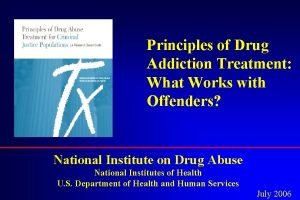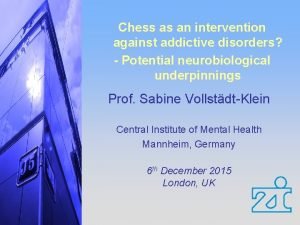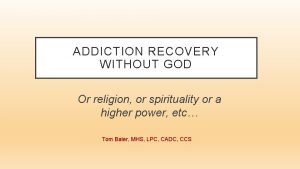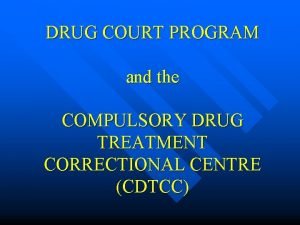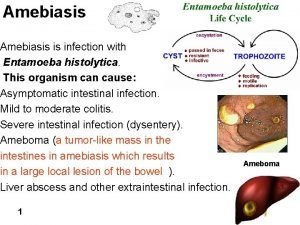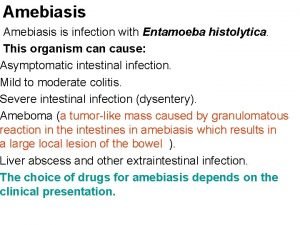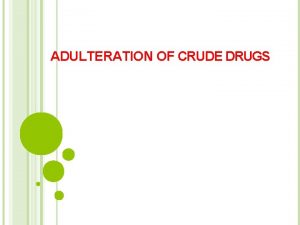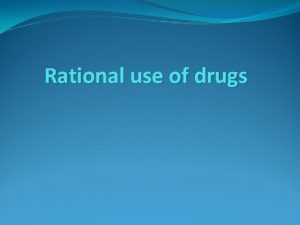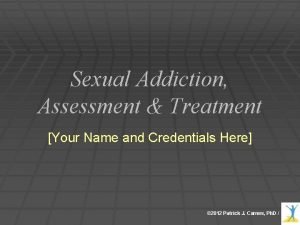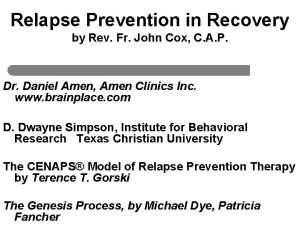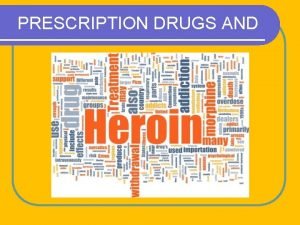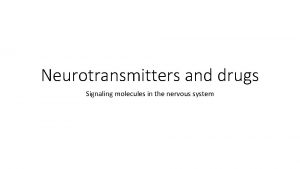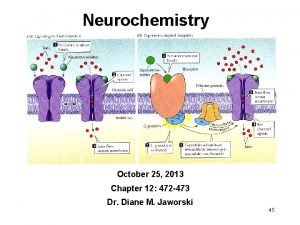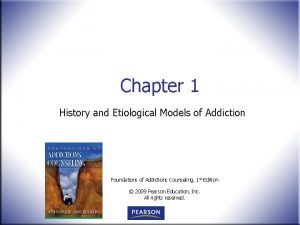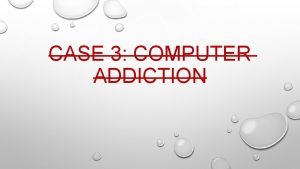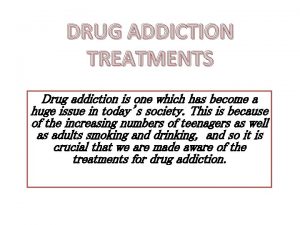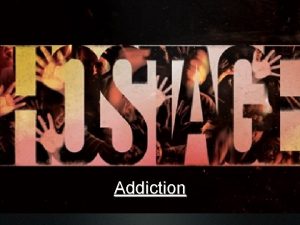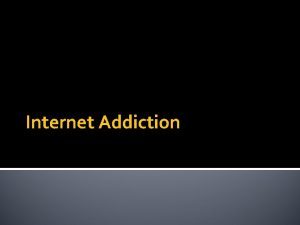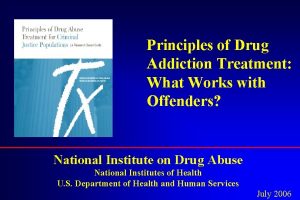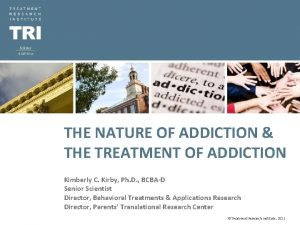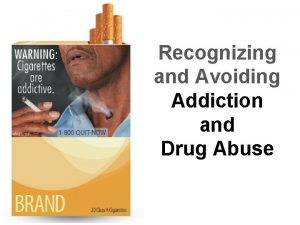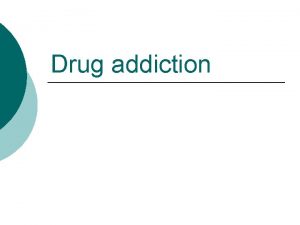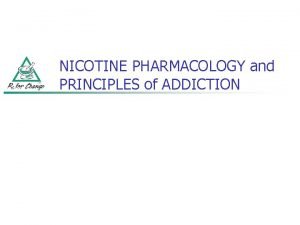Principles of Drug Addiction Treatment Drug addiction is















- Slides: 15

Principles of Drug Addiction Treatment

�Drug addiction is a complex illness. �characterized by intense and, at times, uncontrollable drug craving, along with compulsive drug seeking and use that persist even in the face of devastating consequences. �It affects multiple brain circuits, including those involved in reward and motivation, learning and memory, and inhibitory control over behavior. That is why addiction is a brain disease.

�But addiction is more than just compulsive drug taking— it can also produce farreaching health and social consequences. �Example: § drug abuse and addiction increase a person’s risk for a variety of other mental and physical illnesses related to a drug-abusing lifestyle or the toxic effects of the drugs themselves.

�Because drug abuse and addiction have so many dimensions and disrupt so many aspects of an individual’s life, treatment is not simple. �Addiction treatment must help the individual stop using drugs, maintain a drug-free lifestyle, and achieve productive functioning in the family, at work, and in society.

Principles of Effective Treatment 1. 2. 3. 4. 5. 6. Addiction is a complex but treatable disease that affects brain function and behavior. No single treatment is appropriate for everyone. Treatment needs to be readily available. Effective treatment attends to multiple needs of the individual, not just his or her drug abuse. Remaining in treatment for an adequate period of time is critical. Behavioral therapies—including individual, family, or group counseling— are the most commonly used forms of drug abuse treatment.

7. Medications are an important element of treatment for many patients, especially when combined with counseling and other behavioral therapies. 8. An individual’s treatment and services plan must be assessed continually and modified as necessary to ensure that it meets his or her changing needs. 9. Many drug-addicted individuals also have other mental disorders. 10. Medically assisted detoxification is only the first stage of addiction treatment and by itself does little to change long-term drug abuse.

11. Treatment does not need to be voluntary to be effective. 12. Drug use during treatment must be monitored continuously, as lapses during treatment do occur. 13. Treatment programs should test patients for the presence of HIV/AIDS, hepatitis B and C, tuberculosis, and other infectious diseases, as well as provide targeted risk-reduction counseling, linking patients to treatment if necessary.

�Why do drug-addicted persons keep using drugs? �Long-term drug use results in significant changes in brain function that can persist long after the individual stops using drugs.

Evidence-Based Approaches to Drug Addiction Treatment �Pharmacotherapies �Opioid Addiction (Methadone, Buprenorphine, Naltrexone, ) �Tobacco Addiction (Nicotine Replacement Therapy (NRT), Bupropion (Zyban ®), Varenicline (Chantix ®) �Alcohol Addiction (Naltrexone, Acamprosate, Disulfiram, Topiramate)

�Behavioral Therapies �Cognitive-Behavioral Therapy (Alcohol, Marijuana, Cocaine, Methamphetamine, Nicotine) �Contingency Management Interventions/ Motivational Incentives (Alcohol, Stimulants, Opioids, Marijuana, Nicotine) �Community Reinforcement Approach Plus Vouchers (Alcohol, Cocaine, Opioids) �Motivational Enhancement Therapy (Alcohol, Marijuana, Nicotine)

�The Matrix Model (Stimulants) � 12 -Step Facilitation Therapy (Alcohol, Stimulants, Opioids) �Family Behavior Therapy �Behavioral Therapies Primarily for Adolescents �Multisystemic Therapy �Multidimensional Family Therapy �Brief Strategic Family Therapy �Functional Family Therapy �Adolescent Community Reinforcement Approach and Assertive Continuing Care

�Sources: Principles of Drug Addiction Treatment, A Researchbased Guide, Third Edition: National Institute on Drug Abuse , National Institutes of Health , US Department of Health and Human Services

�If you’re good with WRITING, NURSING RESEARCH , Would you be interested in having a 6 month intensive On-the-Job Training (OJT) with Educate Simplify here in Iloilo?

�You will receive a Certificate of Completion with Philippine & US Accreditations.

�Educate Simplify will be opening four (4) slots only. �For those who are interested, kindly send your resume and a one paragraph answer to this question “Why do you think you’re going to be good in this position? ” at educatesimplify@gmail. com
 Principles of drug addiction treatment
Principles of drug addiction treatment Journal of neuroscience methods
Journal of neuroscience methods Avrt addiction treatment
Avrt addiction treatment Compulsory drug treatment correctional centre
Compulsory drug treatment correctional centre Neurosurgery
Neurosurgery Drug of choice for the treatment of extraluminal amebiasis
Drug of choice for the treatment of extraluminal amebiasis Drug of choice for the treatment of extraluminal amebiasis
Drug of choice for the treatment of extraluminal amebiasis Example of crude drug adulterated with exhausted drug
Example of crude drug adulterated with exhausted drug 9 rational use of drugs
9 rational use of drugs Sex addiction assessment
Sex addiction assessment Faster scale addiction
Faster scale addiction Learn.genetics.utah/content/addiction/mouse
Learn.genetics.utah/content/addiction/mouse Http://learn.genetics.utah.edu/content/addiction/
Http://learn.genetics.utah.edu/content/addiction/ Adrenaline in the brain
Adrenaline in the brain Etiology model
Etiology model According to laura clark (2014) an education correspondent
According to laura clark (2014) an education correspondent
